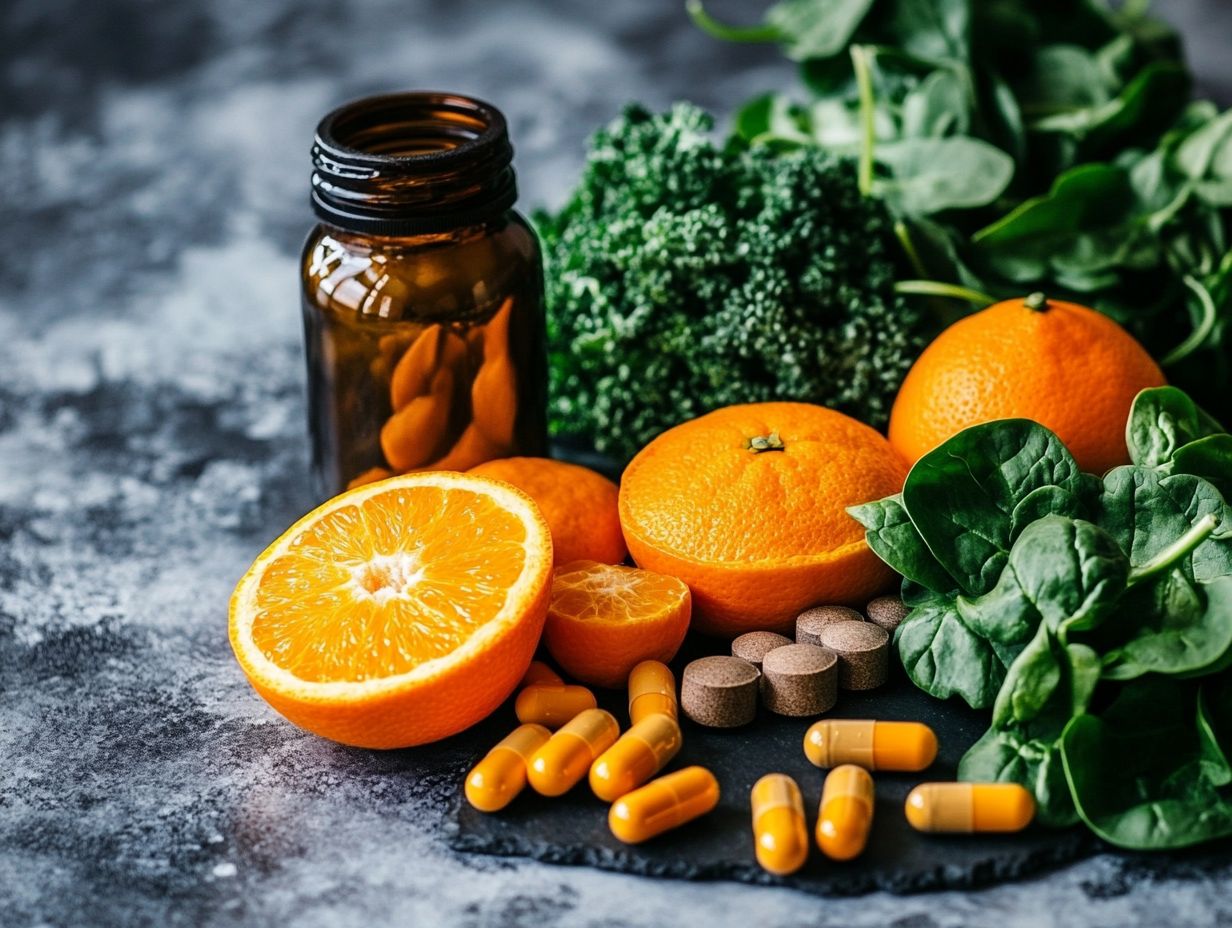5 Essential Vitamins in Dietary Guidelines
Vitamins are essential for maintaining your overall health and well-being. With a plethora of options available, it can be daunting to determine which ones are truly vital and how to easily incorporate them into your diet. Don’t miss out on your chance to thrive!
This article delves into five key vitamins A, C, D, E, and K. It explores their unique benefits, food sources, and the recommended daily intake for each. Additionally, it sheds light on the potential risks associated with both deficiency and excess, offering practical tips to help you meet your nutritional needs.
Unlock the secret to vibrant health with these essential vitamins today!
Contents
- Key Takeaways:
- 1. Vitamin A
- 2. Vitamin C
- 3. Vitamin D
- 4. Vitamin E
- 5. Vitamin K
- Understanding Dietary Guidelines for Essential Vitamins
- Frequently Asked Questions
- What are the 5 essential vitamins in dietary guidelines?
- Why are these 5 vitamins considered essential?
- What are the dietary sources of these 5 essential vitamins?
- How much of these 5 vitamins should you consume daily?
- What are the health benefits of these essential vitamins?
- Can you use supplements to meet your vitamin needs?
Key Takeaways:

Vitamin A supports healthy vision, immune function, and cell growth. It can be found in foods like carrots, sweet potatoes, and spinach.
Vitamin C helps with wound healing, immune function, and collagen production. Citrus fruits, peppers, and broccoli are great sources.
Vitamin D is essential for strong bones and teeth, and can be obtained through sunlight, fatty fish, and fortified dairy products.
1. Vitamin A
Vitamin A is an essential nutrient that contributes significantly to your overall health. It plays a pivotal role in vision and immune system function.
This powerhouse vitamin helps produce light-detecting pigments in the retina, ensuring your vision remains sharp even in dimly lit environments.
Vitamin A also enhances the effectiveness of white blood cells, crucial players in your body’s defense against infections. Its antioxidant properties neutralize free radicals and reduce oxidative stress.
To optimize your intake, include vibrant carrots, leafy greens like spinach, and nutrient-rich liver in your meals.
According to USDA guidelines, aim for a daily intake of around 700 to 900 micrograms of vitamin A units to fully enjoy these health benefits.
2. Vitamin C
Vitamin C is celebrated for its powerful antioxidant properties. It safeguards your body against chronic diseases while boosting your immune system and supporting collagen production.
This vital vitamin is key in fighting oxidative stress, which can harm your cells and lead to various health issues. By neutralizing free radicals, it helps reduce inflammation and enhances overall well-being.
For optimal health, consider incorporating a variety of rich food sources into your diet, such as:
- Citrus fruits like oranges and grapefruits
- Vibrant strawberries
- Nutrient-dense bell peppers
Health experts, including those from Harvard Medical School, recommend that adults aim for about 65 to 90 milligrams of Vitamin C each day to enjoy its protective effects on immunity and skin health.
3. Vitamin D
Vitamin D is an essential fat-soluble vitamin that plays a vital role in maintaining bone health. It also enhances immune function and regulates calcium levels in your body.
Given its significance, many reputable health organizations recommend monitoring your vitamin D levels to prevent deficiencies. These deficiencies could lead to conditions like osteoporosis and weakened immunity.
You can naturally obtain vitamin D from various food sources, such as fatty fish like salmon and sardines, along with fortified dairy products.
Moreover, sunlight plays a crucial role in the synthesis of this vitamin; exposure helps your body produce it. This interconnection between diet and lifestyle underscores how to effectively promote your overall health.
4. Vitamin E

Vitamin E is a vital antioxidant that protects your cell membranes from oxidative damage. It supports skin health and immune function, underscoring its significance in a balanced diet.
This essential vitamin acts as a shield against chronic diseases like heart disease and certain cancers. By neutralizing free radicals, it helps prevent cellular damage.
Include Vitamin E-rich foods like nuts, seeds, and green leafy vegetables in your diet today for better health! Not only do they provide this powerful antioxidant, but they also come with additional health benefits.
The National Academy of Medicine recommends a daily intake of about 15 milligrams for adults. It’s essential to choose a variety of foods now to meet your nutritional needs!
5. Vitamin K
Vitamin K is an important vitamin for proper blood clotting and robust bone health. Its significance cannot be overstated when it comes to achieving balanced nutrition.
This vitamin is crucial in the clotting process, helping your body stop bleeding when injuries occur. Vitamin K also plays a vital role in calcium metabolism, enabling your bones to absorb this important mineral.
To align with dietary recommendations, consider adding dark leafy greens like kale and spinach, as well as fermented foods, into your meals. These options enhance your diet while offering a wealth of health benefits.
According to Ohio State University, consuming adequate amounts of Vitamin K is essential for promoting overall well-being and preventing deficiencies.
Understanding Dietary Guidelines for Essential Vitamins
Dietary guidelines provide a comprehensive framework to ensure you’re getting enough essential vitamins like A, C, D, E, and K. However, many people may overlook certain nutrients. Discovering the 5 vitamins you might be missing in your diet is crucial for optimal health and preventing chronic diseases.
Established by reputable health organizations such as the USDA, these guidelines specify the Dietary Reference Intakes (DRIs) for each vitamin. This helps you understand the recommended daily allowances based on age groups and health conditions.
For example, vitamin A is vital for vision and immune function. Vitamin C is key for collagen synthesis and antioxidant protection, encouraging a balanced diet filled with fruits, vegetables, whole grains, and lean proteins.
This approach ensures you receive the complete spectrum of vitamins necessary for overall well-being.
What Are the Benefits of Each Vitamin?
Each vitamin offers unique benefits that enhance your overall health.
For instance, Vitamin A is essential for vision and immune support. Vitamin C provides powerful antioxidant properties, while Vitamin D is crucial for maintaining bone health.
Vitamin E stands out as a potent antioxidant that helps combat oxidative stress and may reduce the risk of chronic diseases, including heart disease.
The B vitamins B6, B12, and folate are vital for healthy metabolic processes and supporting nerve function. They also aid in the formation of red blood cells.
These B vitamins significantly contribute to heart health by regulating homocysteine levels, which, when elevated, are linked to cardiovascular issues. Vitamin K is also important for proper blood clotting and bone metabolism, further enhancing your physical well-being.
What Are the Food Sources for These Vitamins?

A diverse array of food sources offers the essential vitamins you need, from vibrant fruits and vegetables to wholesome fats and fortified products. These options are perfectly aligned with dietary guidelines for optimal nutrient intake.
To ensure you meet your vitamin requirements, it s crucial to incorporate a variety of whole foods into your diet, such as:
- Leafy greens for Vitamin K
- Citrus fruits for Vitamin C
- Nuts for Vitamin E
Fortified cereals can serve as excellent sources of B vitamins. Fortified dairy products like milk and yogurt provide a healthy dose of Vitamin D. Embrace a balanced diet today! You’re not just enhancing your overall health; you’re also supporting important body functions, ensuring that every essential vitamin is adequately consumed.
How Much of Each Vitamin Is Recommended for Daily Intake?
Daily intake recommendations for vitamins are tailored to your age, gender, and life stage. Established dietary reference intakes underscore the significance of adequate consumption for optimal health.
For example, the National Academy of Medicine advises that you should aim for 1.3 mg of Vitamin B6 each day. Older adults may need a bit more to support cognitive functions. Vitamin C intake is set at 90 mg for men and 75 mg for women. This is essential for enhancing immune function and promoting skin health.
Neglecting these vital nutrients can lead to various health challenges, including weakened immunity, fatigue, and even chronic diseases. Understanding your specific requirements, as outlined by authoritative sources like the USDA, enables you to make informed dietary choices. This significantly influences your overall well-being.
What Are the Risks of Deficiency or Excess of These Vitamins?
Both a deficiency and an excess of vitamins can pose significant health risks, affecting your body s functions and potentially increasing your chances of chronic diseases.
Take Vitamin C, for example. A deficiency can lead to scurvy, a disease caused by a lack of Vitamin C, which brings along fatigue, joint pain, and skin issues. Conversely, too much Vitamin C can wreak havoc, causing gastrointestinal disturbances and even kidney stones.
Then there’s Vitamin D; a lack of it can result in bone disorders like rickets in children or osteomalacia in adults. An excess can lead to hypercalcemia, which might damage your kidneys and heart.
Let s not forget the B vitamins. A deficiency in B12 can lead to anemia and neurological problems, while too much B6 could result in nerve damage.
Grasping these complex dynamics is essential for maintaining optimal health and steering clear of the adverse effects that can emerge from both the deficiency and excess of vitamins.
How Can One Ensure They Are Getting Enough of These Vitamins in Their Diet?
To ensure you re getting an adequate intake of essential vitamins, follow dietary guidelines that emphasize a balanced diet rich in diverse food sources. This is key to meeting your nutritional needs.
One effective strategy is meal planning, which allows you to intentionally include fruits, vegetables, whole grains, and lean proteins throughout the week. Incorporating a variety of foods enhances flavor and provides a broad spectrum of vitamins that your body craves.
Understanding label information on fortified products is crucial. By checking these labels, you can pinpoint necessary vitamins that might be missing from your diet.
By taking small, consistent steps like experimenting with new recipes or adding a rainbow of foods to each meal you can effortlessly elevate your vitamin intake and support your overall health.
Frequently Asked Questions

What are the 5 essential vitamins in dietary guidelines?
The 5 essential vitamins in dietary guidelines are Vitamin A, Vitamin C, Vitamin D, Vitamin E, and Vitamin K. For more information, check out the 5 must-have ingredients for following dietary guidelines.
Why are these 5 vitamins considered essential?
These 5 vitamins are considered essential because they are required for various bodily functions and cannot be produced by the body in sufficient amounts, highlighting the role of supplements in dietary guidelines.
What are the dietary sources of these 5 essential vitamins?
The dietary sources of these 5 essential vitamins include fruits, vegetables, nuts, seeds, dairy products, and fortified foods.
How much of these 5 vitamins should you consume daily?
The daily intake of these 5 vitamins varies by age, gender, and lifestyle. Adults should generally aim for:
- 700-900 micrograms of vitamin A,
- 75-90 milligrams of vitamin C,
- 600-800 International Units (IU) of vitamin D,
- 15-19 milligrams of vitamin E, and
- 90-120 micrograms of vitamin K.
What are the health benefits of these essential vitamins?
These 5 vitamins offer numerous health benefits. They can boost your immune system, enhance skin and eye health, strengthen bones, and support blood clotting as well as wound healing.
Can you use supplements to meet your vitamin needs?
Sometimes, supplements are necessary to reach your daily vitamin goals. However, getting these vitamins from a balanced diet is always the best choice!






